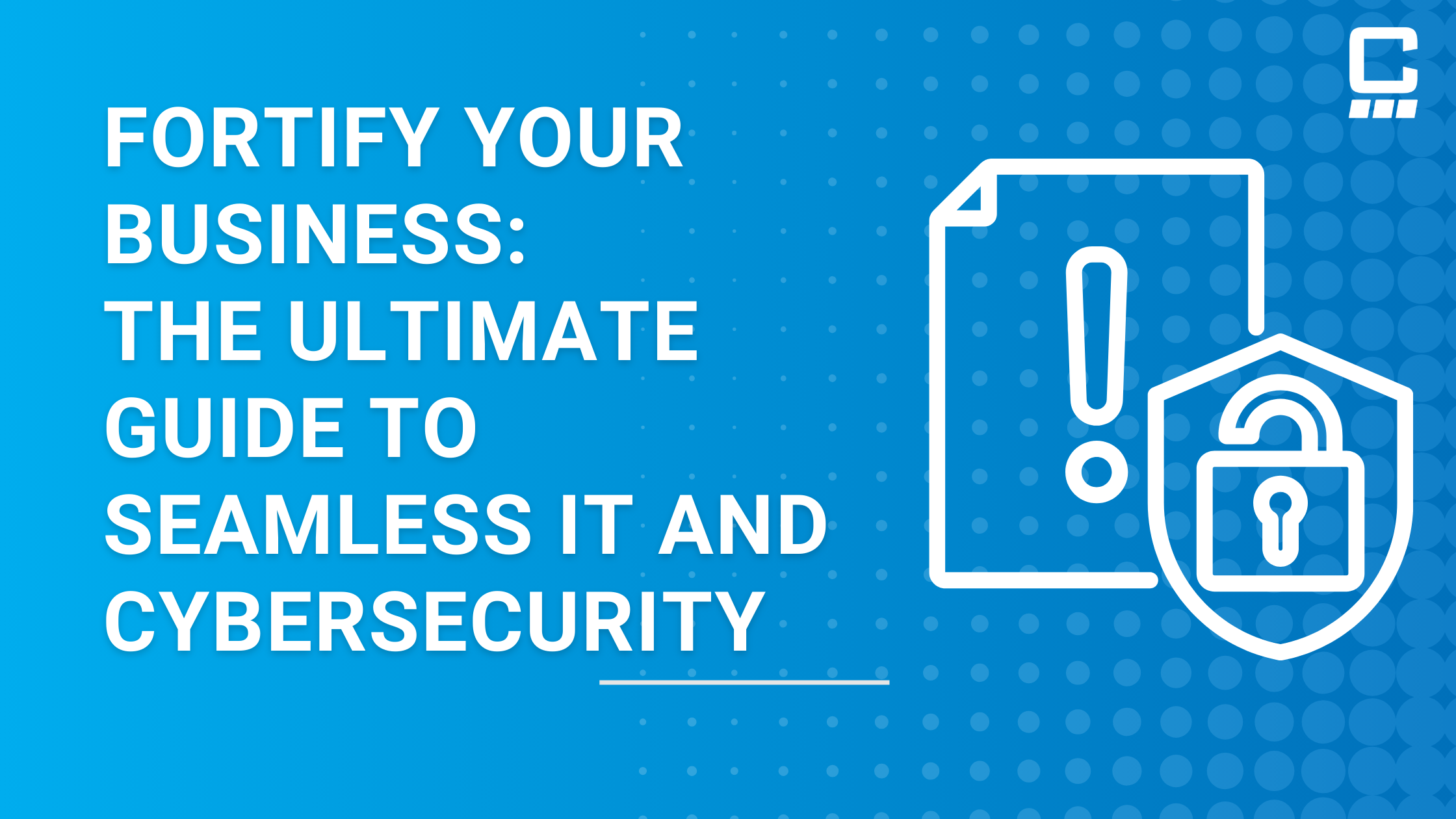
Introduction
With practically everything going digital these days, no business can afford to overlook the importance of IT and cybersecurity. With data privacy regulations tightening and cyber threats on the rise, businesses in Connecticut face an array of challenges in protecting their customers and overall operations. That’s because cyberattacks that target small and medium-sized businesses can lead to costly breaches, loss of customer trust, and compliance fines. As a business leader in Connecticut, it’s crucial to understand the proactive steps you can take to defend your organization from these threats.
In this guide, we’ll break down why strong IT and cybersecurity solutions are essential for Connecticut businesses in 2024. We’ll cover the top IT and cybersecurity challenges specific to Connecticut companies, essential IT services that safeguard your operations, and how an effective cybersecurity strategy protects your business against threats. You'll also gain actionable steps to fortify your business’ IT systems, along with cybersecurity tips to help secure your company and its reputation.
Why Connecticut Businesses Need Strong IT and Cybersecurity Solutions
In Connecticut’s competitive business landscape, having a robust IT framework and cybersecurity strategy is essential, not only to protect against cyber threats but also to ensure compliance with state and federal regulations. Businesses here face many requirements, particularly with laws like the Connecticut Data Privacy Act (CTDPA) and industry-specific mandates. Compliance with these standards requires data protection protocols, regular system audits, and an IT infrastructure to prevent costly breaches.
Industries such as finance, healthcare, and manufacturing encounter specific regulatory challenges and heightened risks. Financial firms, for instance, must not only secure sensitive customer data but also comply with regulations from the Securities and Exchange Commission (SEC) and the Financial Industry Regulatory Authority (FINRA). These requirements call for data management practices, as well as protection against sophisticated cyberattacks like phishing and ransomware.
Healthcare organizations, on the other hand, must prioritize patient privacy and data security in compliance with the Health Insurance Portability and Accountability Act (HIPAA). Given the sensitive nature of patient information, healthcare providers need reliable cybersecurity measures to safeguard data and avoid hefty fines.
Manufacturing companies in Connecticut also face cybersecurity demands, especially those that work with the Department of Defense (DoD). Standards such as the Cybersecurity Maturity Model Certification (CMMC) and Defense Federal Acquisition Regulation Supplement (DFARS) mandate strict controls to protect Controlled Unclassified Information (CUI). For manufacturers, these regulations mean that cybersecurity isn’t just about protecting intellectual property, it’s about meeting the government’s security requirements and maintaining eligibility for lucrative contracts.
Top IT and Cybersecurity Challenges Facing Connecticut Companies
Connecticut businesses face a variety of IT and cybersecurity challenges that can hinder their operations. Some of the most common challenges impacting local companies are:
-
Phishing Attacks: These social engineering attacks target employees, tricking them into revealing sensitive information or credentials. Phishing can lead to data breaches and system compromises.
-
Ransomware: Cybercriminals use ransomware to encrypt critical business data, demanding payment for its release. Ransomware attacks can bring business operations to a halt, resulting in costly downtime, data loss, and reputational damage.
-
Data Compliance Requirements: Meeting regulations such as HIPAA, FINRA, and CMMC can be challenging for businesses that lack specialized IT support. Non-compliance can lead to legal penalties, financial fines, and loss of customer confidence.
-
Insider Threats: Employees, contractors, or vendors with access to company systems can pose security risks, whether through negligence or malicious intent. Managing insider threats requires security training and access controls.
-
System Downtime: IT infrastructure failures, whether due to aging equipment, malware, or natural disasters, disrupt business operations.
-
Supply Chain Vulnerabilities: Many Connecticut companies rely on third-party vendors for various services, which can introduce security risks if those vendors are not adequately protected.
-
Outdated Software and Hardware: Using outdated systems leaves businesses vulnerable to cyberattacks and hinders compliance efforts.
Essential IT Services for Connecticut Businesses
To maintain a secure, resilient, and growth-ready infrastructure, Connecticut businesses require a range of essential IT services. Some of the key IT services that support security and business continuity are:
- Network Monitoring: Continuous monitoring helps detect and respond to unusual activity or potential threats, ensuring that networks stay secure and operate efficiently.
- Disaster Recovery: A disaster recovery plan prepares businesses for unexpected disruptions, enabling rapid recovery and minimizing downtime to maintain business continuity.
- Secure Data Backup: Regular, secure data backups protect against data loss from cyberattacks or system failures.
- Security Awareness Training: Educating employees on security best practices and recognizing cyber threats, like phishing and social engineering, strengthens the first line of defense in your organization.
- Security Information and Event Management (SIEM): SIEM solutions provide real-time analysis of security alerts generated by hardware and software, helping businesses identify and respond to potential threats faster.
- Managed Detection and Response (MDR): MDR services offer round-the-clock monitoring, threat detection, and incident response, adding an additional layer of proactive security.
Partnering with a managed IT service provider in Connecticut, such as Charles IT, can offer significant advantages. By outsourcing these IT services to a trusted provider, businesses gain access to advanced tools, experienced IT professionals, and dedicated support, all without the overhead of maintaining an in-house IT team. Charles IT specializes in delivering customized cybersecurity solutions, allowing Connecticut companies to focus on growth with peace of mind that their systems are secure.
How Cybersecurity Protects Your Connecticut Business from Threats
Effective cybersecurity protections are critical for protecting Connecticut businesses from a variety of threats. Essential cybersecurity measures that every business should implement to stay secure include:
- Firewalls: These act as a barrier between your internal network and external threats, blocking unauthorized access and preventing malicious traffic from entering your systems.
- Multi-Factor Authentication (MFA): MFA adds an extra layer of security by requiring users to verify their identity with two or more forms of authentication, reducing the risk of unauthorized access.
- End-to-End Encryption: This ensures that data is encrypted throughout its journey, from sender to recipient, protecting sensitive information from interception during transmission.
- Dark Web Monitoring: This monitors the dark web for stolen data or compromised credentials related to your business, allowing you to address security issues before they escalate.
- External Vulnerability Scanning: This regularly scans systems and networks for potential vulnerabilities, helping businesses identify and address security gaps.
By continuously monitoring for risks and identifying vulnerabilities before they can be exploited, these tools help businesses mitigate threats in real-time. This approach protects critical and allows Connecticut businesses to maintain operations, stay compliant, and build trust with customers. Implementing a cybersecurity strategy can be the difference between a minor security incident and a costly breach.
Steps to Fortify Your Connecticut Business IT Systems
Taking a strategic approach to IT security is essential for Connecticut businesses aiming to protect their assets and data. The steps to strengthening your IT infrastructure and cybersecurity posture are:
- Conduct a Risk Assessment: Start by identifying and assessing potential threats and vulnerabilities within your IT environment. Understanding the specific risks your business faces allows for more targeted security measures.
- Develop a Security Roadmap: Based on your assessment, create a timeline or roadmap that outlines priority areas for security improvements. This plan should detail which security measures to implement immediately and which to phase in over time.
- Apply Regular Security Patches and Updates: Keep all software, operating systems, and applications up-to-date with the latest security patches to close vulnerabilities that hackers could exploit.
- Set Up a Backup System: Ensure regular, secure backups of your critical data to protect against data loss from cyberattacks or system failures.
- Establish an Incident Response Plan: Develop a plan that outlines the steps to take in case of a security breach.
- Monitor and Review Security Measures: Regularly review and update your security protocols to address emerging threats and ensure continued compliance with industry standards.
Cybersecurity Tips for Protecting Connecticut Businesses in 2024
As cyber threats continue to evolve, Connecticut businesses must adopt best practices to protect data, prevent breaches, and secure increasingly remote work environments. Essential tips for strengthening cybersecurity in 2024 include:
- Prioritizing Data Encryption: Encrypt sensitive data both at rest and in transit to ensure that even if data is accessed without authorization, it remains unreadable.
- Using Strong Access Controls: Limit access to sensitive data and systems to only those who need it. Employ role-based access control (RBAC) to restrict access based on job roles.
- Securing Remote Work Environments: Equip remote employees with secure devices, use Virtual Private Networks (VPNs) for secure access, and enforce Multi-Factor Authentication (MFA) on all accounts.
- Conduct Regular Vulnerability Scans and Penetration Testing: Identify and address vulnerabilities before they can be exploited by cybercriminals.
Conclusion
A comprehensive IT and cybersecurity approach is critical for Connecticut businesses to thrive. By addressing everything from risk assessments and employee training to advanced protections like encryption and vulnerability scanning, companies can protect their data, maintain compliance, and secure their operations against threats. Prioritizing IT infrastructure even builds trust with customers, ensures business continuity, and helps your business stay competitive.
If you're ready to strengthen your business’s security and IT foundation, contact Charles IT. As a trusted partner for Connecticut businesses, we’re here to provide the expert guidance and support you need to fortify your operations.




